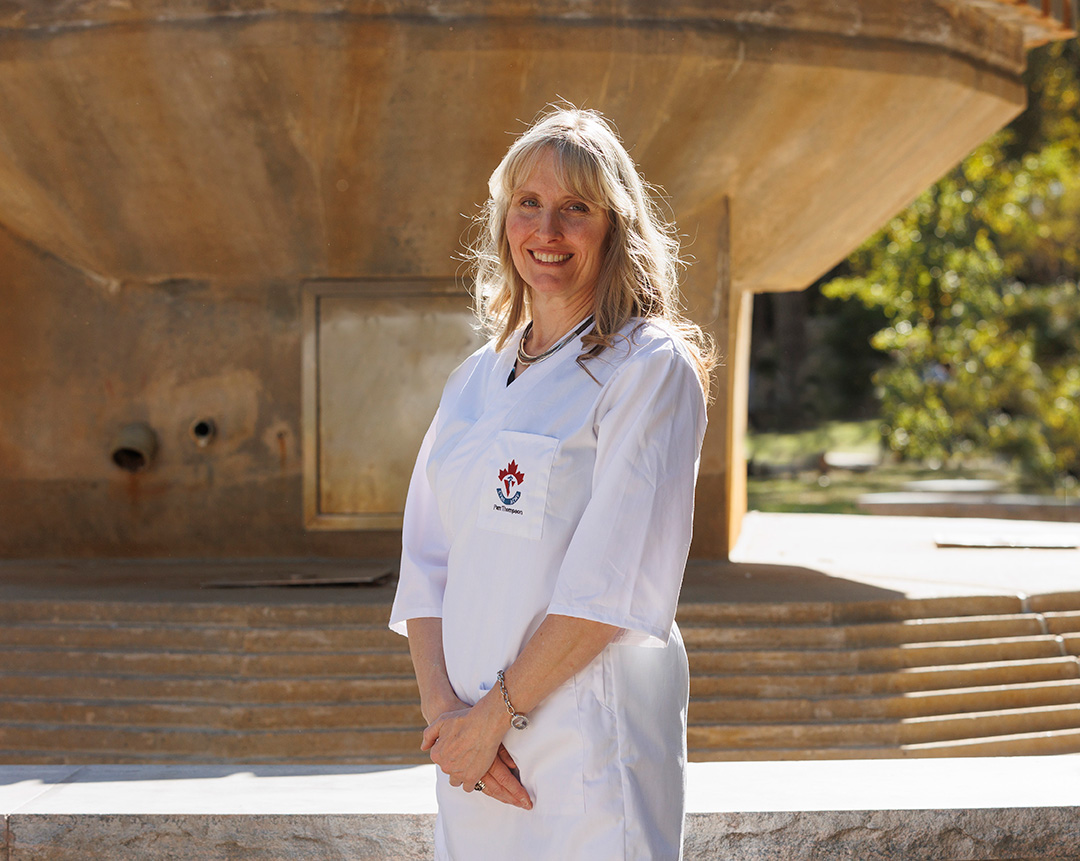
Veterinary career combines all of student’s One Health passions
From the time that she completed a Doctor of Medicine (MD) degree and a residency in family medicine in 2005, Dr. Pamela Thompson dedicated herself to a fulfilling career in human health that encompassed clinical work, teaching and community collaborations.
By Lynne GunvilleWhile she approached each new challenge with passion and vigour, Thompson maintained a profound interest in veterinary medicine — a career she had contemplated during her undergraduate years.
She eventually decided to refocus on that interest and develop a new life plan.
“The recent pandemic allowed me the opportunity to reflect on my own sense of value in the context of my professional direction and passions,” says Thompson, now a first-year student at the Western College of Veterinary Medicine (WCVM). “I desire to be of value to my community by redirecting my background and passions toward veterinary medicine as it combines my love of animals, medicine, teaching and research.”
Thompson’s connection to animals began at a young age when she became involved with English and Western riding and competed at high-level competitions across North America. She went on to own three top-level competition horses including her favourite horse, Tiger Day.
Although Thompson never lost her fondness for animals, she ultimately chose a career in human medicine and was particularly passionate about advocating for individuals facing barriers to achieving their best health.
Influenced by her parents who had emphasized the value and importance of serving one’s community, Thompson started her medical career working as a family physician at a Calgary community clinic that focused on providing services to underserved individuals.
After witnessing the challenges and the health inequities that faced homeless individuals, Thompson volunteered to co-chair a subcommittee for the Calgary Committee to End Homelessness. Her efforts resulted in a unique Housing First program that provided housing and support services to individuals with mental health and substance use disorders.
When the successful program revealed a need to enhance the knowledge and skills of the healthcare providers delivering the services, Thompson co-developed a curriculum specifically aimed at addressing that need.
Over the next several years, Thompson remained in Alberta, working as a director for Calgary’s Alex Pathways to Housing Program, then as a consultant for the Government of Alberta and finally as a family physician at a clinic that provided care to underserved patients.
In 2013 Thompson made a move to Arizona where she took an assistant professor position at Arizona State University. There she worked with students and faculty from Arizona’s three state universities to create a community health initiative, Student Health Outreach for Wellness (SHOW).
The student-run clinic provided practical experience for faculty and students from a wide variety of disciplines as they focused on delivering person-centred health care to underserved populations.
“A core element of this initiative was teaching students the importance of giving back to their community,” says Thompson. “The clinic continues today and is an accomplishment I’m particularly proud of.”
Once Thompson decided to make the shift from treating people to treating animals, she began volunteering at small and large animal practices. She also sought advice and support from several veterinary professionals, including WCVM alumna Dr. Erin Parchello (DVM’99) from Cranston Veterinary Hospital, WCVM graduate Dr. Neil Nyberg (DVM’18) and his team at Agrifarm Veterinary Services, and Cat Harbord at ImPAWSible Possible Inc., who taught her a great deal about canine behaviour.
In addition, Thompson became involved with the Canadian Animal Blood Bank (CABB), first as a volunteer serving on the CABB Foundation Board of Directors and later as an operations consultant.
“The organization is a charity whose mission is to save the lives of dogs across Canada by making the highest quality blood products available to veterinarians and supporting veterinary professional education in transfusion medicine,” says Thompson, who encourages owners of healthy dogs to participate in the program.
A dog owner herself, Thompson and her two rescue dogs participate in agility, flyball and scent detection events. As well as attending regular classes, workshops and training sessions with her dogs, Thompson has created an at-home training facility for them.
“My early experiences in equine competition provided me with transferable knowledge and skills that I have applied in the competitive canine sports environment,” says Thompson. “It’s such a joy to work with my dogs as they love to learn new skills in our training classes and leave with big dog grins on their faces!”
While Thompson’s plans include working at mixed animal clinical practices in rural underserved communities, she also intends to work internationally with organizations such as Veterinarians without Borders/Vétérinaires sans frontières, and she has a strong interest in public health and One Health.
As well, Thompson hopes to use her veterinary education to make a difference in the global community by collaborating on community-based initiatives, developing animal welfare policy, participating in research and mentoring future veterinary professionals.
“I aspire to be a veterinary clinician and professional that provides exceptional care, advocates for continual improvements in animal welfare and contributes to work in both public health and One Health initiatives to achieve the best possible global health outcomes,” says Thompson.
“I will bring my love of animals, professional and personal experience, and passion to be of value to the veterinary profession.”
